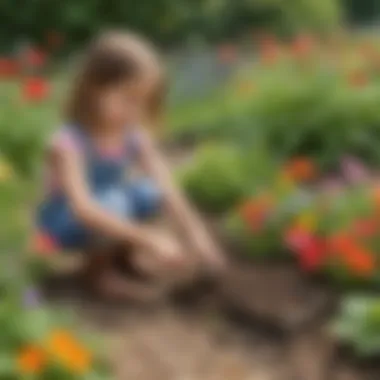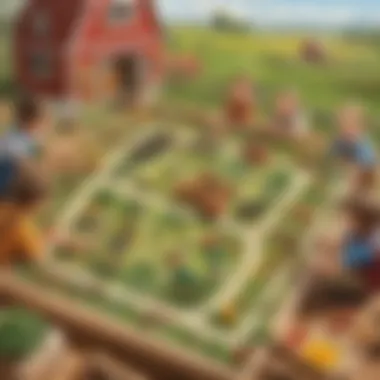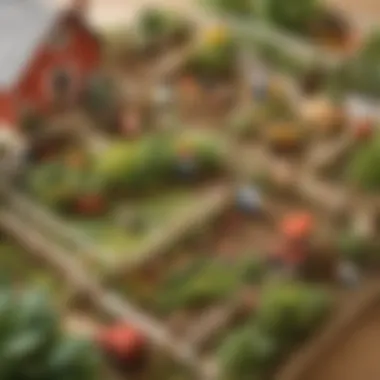Enriching Preschool Minds: Farm-Themed Lesson Plans for Young Learners


Science Fun Facts
When it comes to farm-themed lesson plans for preschoolers, engaging young minds is key. Here are some interesting science fun facts that will pique curiosity: Did you know that cows have four compartments in their stomachs to help digest their food efficiently? Or that bees perform a unique 'waggle dance' to communicate the location of food sources to their hive mates? These quirky yet fascinating facts can intrigue little learners and spark their interest in the world of agriculture and animal science.
Discover the Wonders of Farm Science
Embark on a journey to explore the wonders of farm science with your preschooler. Uncover various scientific concepts through hands-on activities like planting seeds, observing the life cycle of a chicken, or learning about the process of photosynthesis in plants. Encourage interactive learning with educational videos showcasing farm life and its significance. Connect these lessons to real-life applications by discussing how farms provide us with food and other essential resources.
Farm Science Quiz Time
Get ready for an exciting farm science quiz session! Engage young minds with interactive quizzes like 'Guess the Farm Animal' or 'Match the Crop to its Plant.' Challenge their knowledge with brain teasers such as 'Which farm animal gives us wool?' or 'What is the main purpose of scarecrows in fields?' Turn learning into a fun and gamified experience that not only educates but also entertains, fostering a deeper understanding of agricultural concepts.
Farm Science Experiment Showcase
Delve into the world of farm science experiments with simple yet engaging activities. Try planting seeds in different conditions to observe plant growth, create a mini compost bin to understand recycling in nature, or conduct a 'milk painting' experiment to explore the concept of color mixing. Provide step-by-step instructions, a materials list including items like soil, seeds, and recycled materials, emphasize safety tips such as washing hands after handling soil, and highlight the importance of being cautious with garden tools.
Intro
Importance of Farm Education
Farm education holds multifaceted benefits for preschoolers, offering a unique blend of sensory experiences and cognitive development. Teaching farming to preschoolers instills in them a profound appreciation for nature and the food production process. An early introduction to agriculture nurtures their understanding of where food comes from, fostering sustainable practices from a young age.
Benefits of Teaching Farming to Preschoolers
The benefits of teaching farming to preschoolers lie in their holistic development. By engaging in farm-themed activities, children enhance their sensory awareness, cognitive skills, and social interactions. Hands-on experience with farm animals and crops provides a tangible learning environment, making abstract concepts concrete and relatable to young learners. This immersive approach sparks curiosity and cultivates a lifelong interest in agriculture.
Early Exposure to Agriculture
Early exposure to agriculture acquaints preschoolers with the origins of their food, connecting them to the broader ecosystem. By witnessing the growth process of crops and interacting with farm animals, children develop a sense of responsibility towards nature and its resources. This exposure fosters a sustainable mindset, nurturing environmentally-conscious individuals from a tender age.


Connection to Nature
The connection to nature fostered through farm education is invaluable for preschoolers. By engaging with the natural world on a farm, children develop empathy, curiosity, and respect for living creatures. This intimate relationship with nature promotes mental well-being, physical activity, and a sense of interconnectedness with all living beings.
Objectives of Farm-Themed Lesson Plans
Farm-themed lesson plans for preschoolers are meticulously designed to achieve specific educational objectives. These plans focus on expanding children's understanding, enhancing their vocabulary, and nurturing their creativity through hands-on activities and interactive experiences.
Development of Understanding
The primary goal of farm-themed lesson plans is to cultivate a deep understanding of agricultural concepts. Through exploring plants, crops, and farm animals, preschoolers develop a nuanced comprehension of the vital roles these elements play in sustaining life. This experiential learning approach stimulates critical thinking and problem-solving skills in young minds.
Enhancement of Vocabulary
Farm-themed lesson plans serve as a catalyst for enriching preschoolers' vocabulary. By introducing agricultural terms, animal names, and crop varieties, children broaden their linguistic repertoire in a meaningful context. This expansion of vocabulary enhances communication skills, encourages language development, and sparks interest in learning new words.
Promotion of Creativity
Creativity flourishes in the farm-themed learning environment provided to preschoolers. Engaging in art projects, pretend play scenarios, and imaginative tasks stimulates children's creativity and innovation. By encouraging free expression and divergent thinking, these lesson plans foster a spirit of exploration and open-mindedness in young learners.
Farm Animals Exploration
Learning About Farm Animals
Identifying Different Farm Animals
Diving into the specifics of Identifying Different Farm Animals, we unearth a fundamental building block of farm education for preschoolers. The process of recognizing various farm animals serves as a gateway to understanding biodiversity and the roles different species play in the ecosystem. By familiarizing children with animals like cows, chickens, and pigs, we not only broaden their knowledge base but also cultivate a sense of responsibility towards these creatures. The ability to identify and differentiate between farm animals equips young learners with observational skills and lays the foundation for future learning endeavors.
Understanding their Role
As we unfold the layers of Understanding their Role in the farm environment, preschoolers gain insights into the interconnectedness of living beings. Each farm animal plays a distinct role, be it providing food, companionship, or labor. Understanding the responsibilities and contributions of animals on the farm nurtures a sense of respect and appreciation in children. By comprehending the significance of each creature, young minds develop empathy and a deep-rooted connection to nature, laying the groundwork for a values-based education.


Interactive Activities
The immersive nature of Interactive Activities brings farm animals to life in the eyes of preschoolers. Engaging in hands-on experiences such as feeding animals, petting calves, or gathering eggs creates lasting memories and fosters a kinesthetic understanding of farm life. These interactive sessions not only educate but also promote sensory development and cognitive skills in young learners. By blending playfulness with education, interactive activities form an integral part of farm-themed lesson plans, enriching the overall learning experience for preschoolers.
Planting and Crops
Planting and Crops play a paramount role in the educational journey of preschoolers, offering a hands-on opportunity to understand the essence of agriculture. The cultivation of plants and crops allows young minds to grasp the concept of growth, nurturing, and sustainability. By engaging in activities related to Planting and Crops, children develop a profound appreciation for nature and the food production process, laying a sturdy foundation for environmental awareness and responsibility.
Exploring Plants on the Farm
Identifying Common Crops
Identifying Common Crops forms a crucial aspect of the preschoolers' learning experience as they familiarize themselves with staple agricultural produce. Recognizing common crops like corn, wheat, and vegetables not only enhances their knowledge but also connects them to the source of many everyday foods. This exploration cultivates a sense of curiosity and understanding about the plant kingdom and its significance in our lives.
Understanding the Growth Process
Understanding the Growth Process exposes preschoolers to the magical journey from seed to plant, instilling in them the marvels of nature and the importance of patience and care in nurturing life. Witnessing firsthand how plants grow and thrive provides valuable lessons on resilience, patience, and the interconnectedness of all living organisms within the ecosystem.
Planting Activities
Engaging in hands-on Planting Activities allows preschoolers to actively participate in the growth cycle of plants, fostering a sense of responsibility and accomplishment. Through planting seeds, watering, and observing growth, children learn about the essential elements needed for plants to flourish, such as sunlight, water, and soil nutrients. These activities not only enhance scientific knowledge but also promote a sense of stewardship towards the environment and living beings.
Farm Scavenger Hunt
Searching for Crops
Incorporating an element of discovery, Searching for Crops in a farm scavenger hunt introduces preschoolers to the thrill of exploration and observation. By searching for various crops like tomatoes, pumpkins, and carrots, children sharpen their observational skills and expand their knowledge of different plant species. This activity stimulates curiosity and encourages an inquisitive approach towards agricultural diversity.
Learning Crop Names


Learning Crop Names serves as a linguistic exercise, improving vocabulary and cognitive skills as preschoolers familiarize themselves with the names of different crops. Identifying crops by name enhances language development and cultivates an understanding of the diverse array of plants grown on farms. This linguistic engagement not only sharpens communication skills but also enriches the children's connection to nature and the agricultural environment.
Scavenger Hunt Prizes
Rewarding preschoolers with Scavenger Hunt Prizes upon completing the farm scavenger hunt reinforces positive behavior and achievement. Prizes can range from farm-themed stickers to small agricultural toys, encouraging participation and motivation in the learning process. This element of reward adds a sense of excitement and accomplishment to the educational experience, making the farm-themed lesson plans engaging and rewarding for young learners.
Farm Environment Immersion
In delving into the realm of Farm Environment Immersion, it becomes apparent that this aspect holds a pivotal role in enlightening preschoolers about the intricacies of rural life. By creating a simulated farm setting, children are transported into a world where they can tangibly experience the essence of agriculture and nature. This immersive experience not only educates but also instills a profound connection with the environment. Through Farm Environment Immersion, young learners develop a heightened sense of appreciation for farming, fostering a deeper understanding of where food comes from and the significance of sustainable practices. It paves the way for holistic learning by integrating practical knowledge with theoretical concepts.
Creating a Farm Setting
Pretend Play Farm:
Pretend Play Farm emerges as a cornerstone in the landscape of Farm Environment Immersion. This facet allows children to engage in imaginative role-playing, assuming the roles of farmers, animals, or even farm equipment. The make-believe farm setting encourages creativity and social interaction among preschoolers, nurturing their cognitive and emotional development. The versatility of Pretend Play Farm lies in its ability to seamlessly blend entertainment with education, making learning a dynamic and engaging process. Its adaptability to various themes and learning objectives renders it a valuable tool in cultivating a fertile learning environment for young minds.
Farm-themed Art Projects:
Delving into Farm-themed Art Projects unveils a realm where creativity intertwines with agriculture, offering a canvas for self-expression and exploration. Through art, children can visually conceptualize their understanding of farm life, showcasing their interpretations through drawings, paintings, or collage work. Farm-themed Art Projects not only enhance artistic abilities but also facilitate the expression of emotions and ideas related to the farm environment. This hands-on approach to learning amplifies sensory experiences, igniting curiosity and imagination in preschoolers, thereby fostering a profound connection between art and agriculture.
Farmhouse Construction:
The inclusion of Farmhouse Construction in Farm Environment Immersion encapsulates the practical dimension of farm life, enabling children to construct miniature farmhouses using diverse materials. This hands-on activity not only hones fine motor skills but also promotes spatial awareness and logical thinking. Farmhouse Construction serves as a gateway to understanding architectural concepts and design principles, offering a unique blend of creativity and structural learning. By engaging in building farmhouses, preschoolers delve into a realm where imagination meets craftsmanship, fostering a sense of accomplishment and innovation within a farm-themed context.
Outdoor Farm Adventure
Field Trip to a Farm:
Embarking on a Field Trip to a Farm unfolds a world of sensory exploration and firsthand experiences for preschoolers. This immersive excursion allows children to witness farming practices, interact with farm animals, and engage with agricultural machinery in a real-world setting. The Field Trip to a Farm not only supplements classroom learning but also provides a tactile understanding of farm operations. It cultivates a sense of awe and wonder in children, triggering a curiosity to delve deeper into the realms of agriculture and nature.
Observing Farm Machinery:
The aspect of Observing Farm Machinery introduces preschoolers to the technological facets of farming, showcasing the equipment and tools essential for agricultural activities. Through observing farm machinery in action, children develop an understanding of the mechanized processes involved in farming practices. This hands-on encounter with agricultural technology instills a fascination for innovation and engineering, bridging the gap between traditional farming methods and modern agricultural practices.
Interacting with Farm Animals:
Interacting with Farm Animals paves the way for a meaningful connection between preschoolers and the diverse fauna found on farms. This interactive experience allows children to observe, touch, and sometimes feed farm animals, fostering empathy and respect for living beings. By interacting with farm animals, young learners develop a compassionate attitude towards animals and understand the symbiotic relationship between humans and livestock. This direct engagement with animals cultivates a sense of responsibility and empathy, nurturing a profound appreciation for the role of animals in agriculture and ecosystem balance.







